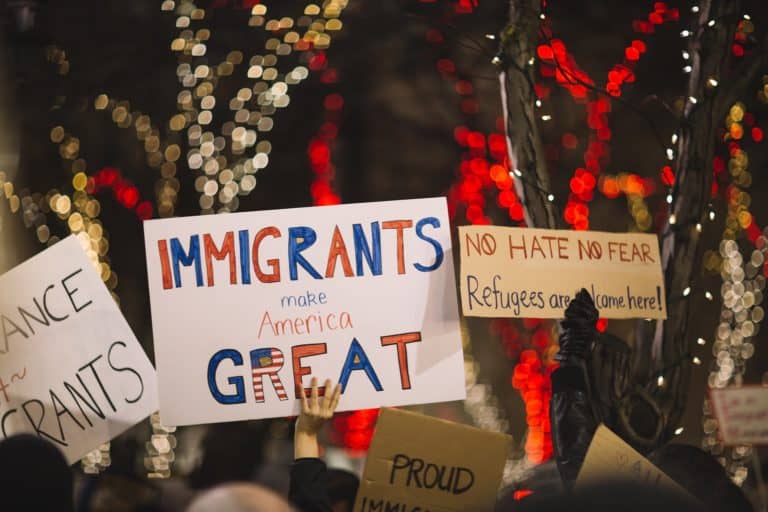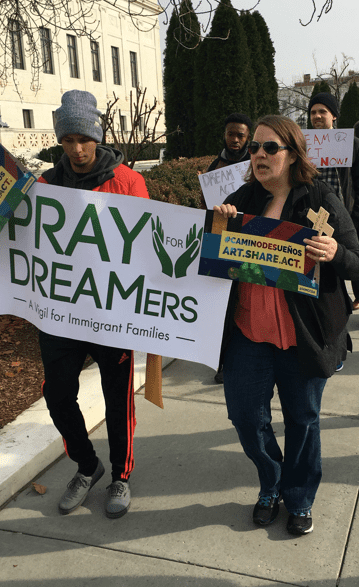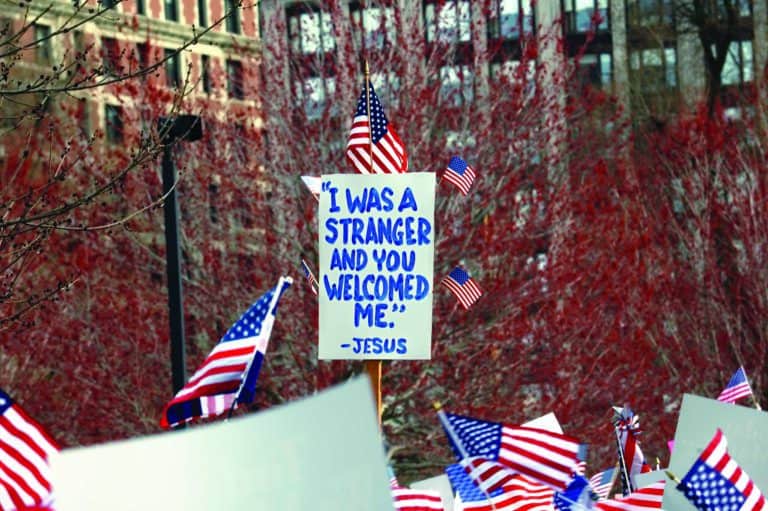Questions for Christians
- Why does God care so much about immigrants?
- What does justice look like for these “strangers” among us?
- What do immigrants have to do with me, and what difference could I possibly make in the lives of displaced people?
- Why is immigration such a conflictual issue for Christians, with some churches offering them sanctuary and others emphasizing the importance of keeping the law? Is there a “biblical” way to view immigrants?
Overview
Throughout the biblical narrative, we see God’s people alternately flourishing then conquered; conquering then enslaved; wandering then established…and finally occupied by the Roman Empire. The Jews knew all too well the bitter taste of famine, the indiginity of slavery, the vulnerability of statelessness. Having suffered so, Israel had every reason to show empathy and kindness towards outsiders, yet they apparently needed God to remind them, often, to treat the foreigners among them well (see Deut. 1:16-17; 5:14; 14:28-29; 24:14-15). The prophets denounced those who mistreated the sojourner (Jer. 7:5-7; 22:2-5), and Jesus, himself a child refugee, identified intimately with the stranger and, in fact, with all who are pushed to the margins of society.
Every person born to citizenship in this country—with the exception of the descendants of First Nations peoples and those brought here against their will via the abomination of slavery—shares the immigrant story, came here in search of safety, freedom, or simply the promise of “a better life.” Like the Israelites, we too must often be reminded of God’s heart for all who bear the imago Dei, exhorted to provide hospitality to strangers and help those in distress. And it is our spiritual legacy, as a people saved not by our own hand but by the merciful hand of God, that equips us to be agents of mercy to our brothers and sisters fleeing war, persecution, and poverty.
migrant children were detained in the U.S., separated from their parents, in 2019. (Associated Press)
immigrants known as Dreamers live in the US, and more than 200k of them are considered “essential critical infrastructure workers” during the pandemic (healthcare, education, and food-related industries). (American Progress)
of immigrants in the US are here legally. (Pew Research Center)


Why it matters
Joshua is a 26-year-old DACAmented immigrant from Mexico who came to the US as a 9-year-old. He says the only Christians he’s met who have truly cared and reached out are those who are immigrants themselves. We asked him what he wished the larger American church knew about immigrants.
“I wish you would take the time to get to know us and understand our struggles, our history, our reasons for coming to this country. We’re not here to steal people’s jobs or bring corruption. My mother was willing to risk traffickers, corrupt coyotes, border police, and other dangers to bring us here. We had to expose ourselves to some incredibly vile things. That’s how desperate immigrants are to get away from their situations. And now every day I live in fear, every time I see a cop. I’m skeptical when I hear of some organization that says they can help me—can I trust them? I don’t get many chances to tell my story. It’s a relief to tell it, to know that people want to understand, because there’s not much I can do to influence the situation.”
In spite of the political narratives that portray immigrants as job-stealers, criminals, or a drain on US resources, the vast majority of immigrants contribute more than they cost, take jobs that support other parts of the economy, help the US maintain the population rate, and are less likely to commit serious crimes than native-born citizens. Misconceptions drive much of the unhelpful rhetoric around immigration today. But the truth liberates and invigorates! Check out this infographic “10 Things You Probably Didn’t Know About Immigrants.” Then ask yourself: How can Christians be part of embracing, empowering and partnering with immigrants to build a healthier country and a stronger church?

What you can do
Personal:
- Get beneath the political narratives. Lean into the hard stories of immigrants.
- To get a feel for why Syrians have left their country, watch The White Helmets docu-series. These are the kinds of realities that make refugees out of so many around the world.
- To understand the risks people undertake to cross the border from Mexico into the US, read the nonfiction account of 14 men in The Devil’s Highway by Luís Alberto Urrea.
- For a glimpse into the challenges that unauthorized immigrants face in this country, watch the feature film The Visitor.
- A Guide to Engaging in Respectful Conversations about Immigration, published by The Evangelical Immigration Table, offers tips on how to engage the conversation around immigration with your friends, family and church community.
Societal:
- Advocate for change:
- Ask Congress to work towards a permanent solution for Dreamers.
- Check out the advocacy campaigns at Interfaith Immigration Coalition.
- Learn about the Syrian refugee crisis and partner with a ministry that helps.
Short-term:
- Explore the complexities of immigration, then plunge in.
- Gather some friends and go through one of the free or low-cost small group study guides on immigration from World Relief or the Evangelical Immigration Table or JustFaith Ministries.
- Volunteer at one of 17 Justice for Our Neighbors clinic sites across the country, each of them providing free or low-cost immigration legal services for low-income immigrants, refugees, and asylum seekers.
Long-term:
- Seek out and build a relationship with one immigrant or a family of refugees. Share your life; make it personal. This is the most effective way to shape our heart to God’s—by turning a “stranger” into a friend.
#PrayforDREAMers

The Immigration Debate: Can the Bible Help?
By M. Daniel Carroll Rodas
The issues surrounding the immigration debate are complex and ongoing. The United States was founded by immigrants, and many can point to ancestors from Europe, Asia, or Africa who reached these shores in the last 250 years.

Caring for Refugees and Immigrants as a Focus on the Family
By Russell Jeung, PhD
“Burmese army soldiers burned down Christian churches in our villages,” my foster daughter explained when asked about why she had to flee the Chin state of Burma.

Families Separated at the Border: Genesis 12 and Romans 13
By Craig Keener
My wife and kids are legal immigrants from Africa. All came from very dangerous situations, but given the limited number of refugees brought into the U.S. each year, probably none of them could have come as refugees.
Additional Resources
- In this PBS Newshour video, watch how Utica, NY has used refugee resettlement as an economic development tool, bringing life back to a dying city and providing a home for thousands of hardworking immigrants.
- The Matthew 25 / Mateo 25 Movement is a broad coalition of Christians that focuses on, among other vulnerable populations, undocumented immigrants threatened with mass deportation, as well as refugees who are being banned despite rigorous vetting.
- Evangelical Immigration Table “is a national movement of Christians committed to learning more about what it means when the Bible says to ‘welcome the stranger’ and living out these biblical principles in our churches, our communities and our nation.” Check out their many ideas and resources.
- The New Sanctuary Movement is “a growing movement of immigrant and over 1100 faith communities doing what Congress and the Administration refuse to do: protect and stand with immigrants facing deportation.”
- The National Justice for Our Neighbors network provides free or low-cost immigration legal services to vulnerable immigrants, refugees, and asylum seekers. They need volunteers!
- National Immigration Forum is a conservative initiative that advocates for “Creating a 21st-Century Immigration System.” They believe that unauthorized status is the greatest barrier to immigrants reaching their fullest potential. Learn about their efforts to build an immigration system that “strikes the right balance between interior enforcement and border security, earned legalization and a path to citizenship, and family and employer immigration.”
- CSA has well over a hundred articles about viewing immigration through the lens of God’s love for immigrants and the call for justice. Check them out here.
